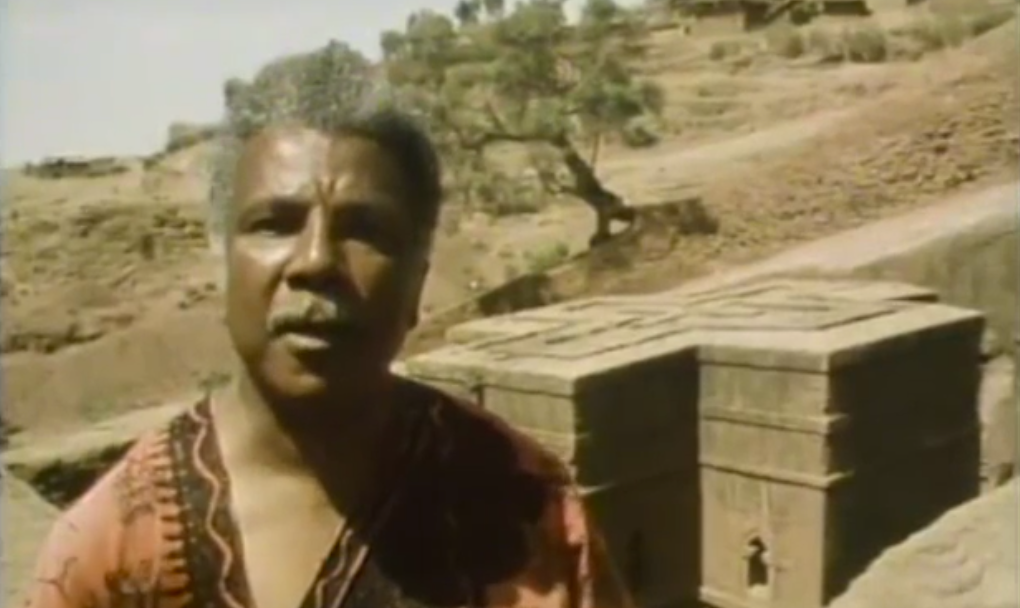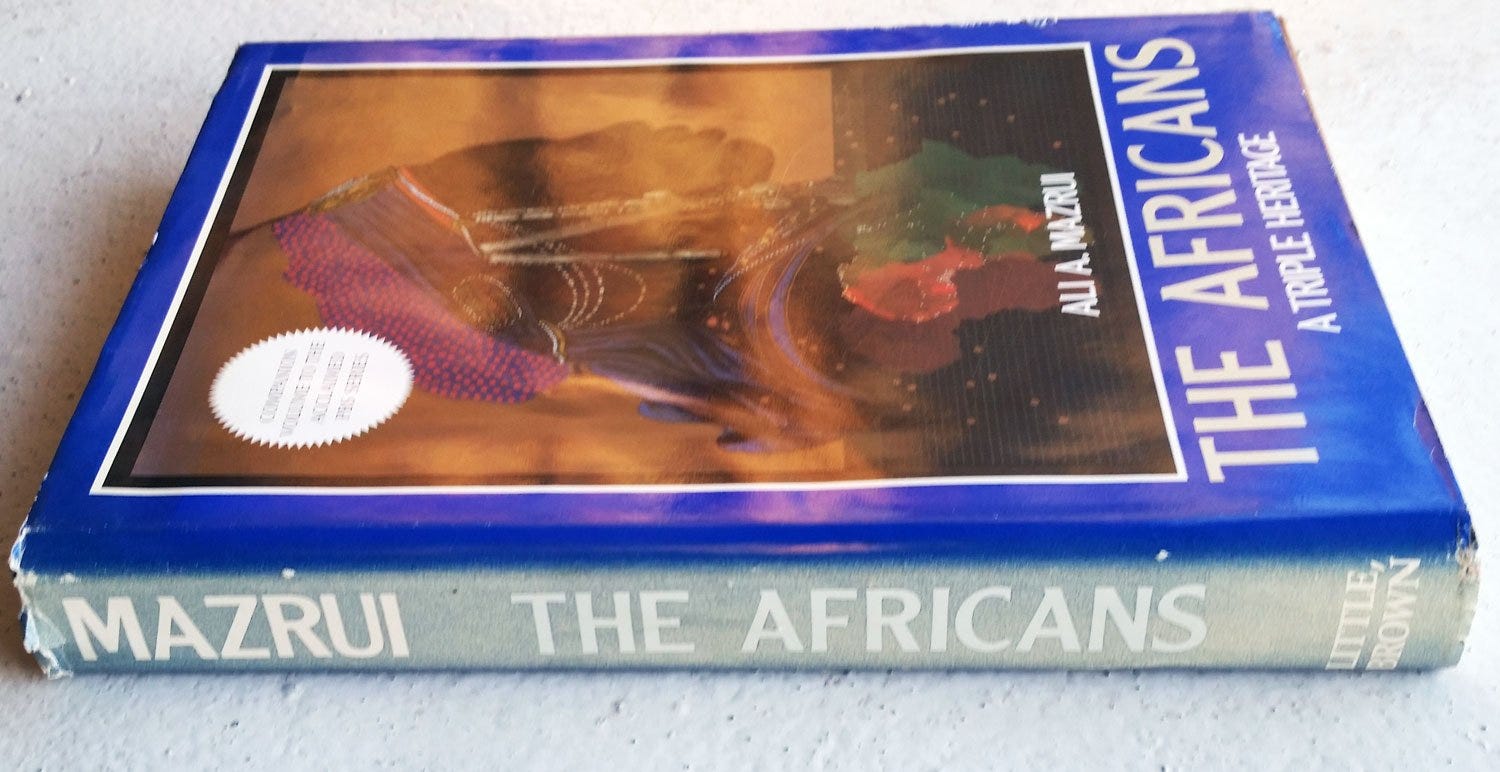b-boy, old dude, Hip-Hop Investigating, music lovin’ Muslim

Ali Mazrui’s The Africans is One of the Best (Forgotten ) Documentaries on Africa
From the outset, The Africans: The Triple Heritage was beset with racist critics and now it’s buried
Over the past thirty years I’ve watched a wide variety of Documentaries on the Continent of Africa, most recently I enjoyed Dr. Gus Casely-Hayford’s Kingdoms of Africa.
While most of them are informative, these Documentaries are often told by outsiders who work to discount myths often originated by their fellow countrymen. Basil Davidson’s Africa: A Journey of Discovery is still lauded as the go to series for understanding the Continent and is the first one that comes to mind in that vein.
Yet, the most profound, well-rounded and even-handed Documentary is almost impossible to find. Although Annenberg Media claimed that it was so, The Africans is unavailable on DVD and can only be purchased on VHS for $1,250 (Or if you happen to go to a school like Brown or Berkeley, you can rent it from their library). You won’t find the entire series on YouTube* either. In fact, the episodes that you do find are either in parts, incomplete, or both.
Once viewed as “the jewel” of PBS’ fall programs, Ali Mazrui’s The Africans ran afoul with the head of the NEH. Later, Ali Mazrui was even attacked by another prominent African. It is by and large the best Documentary on Africa, aired throughout my High School years, shaped my worldview and understanding of White Supremacy and hasn’t been seen by the general public in decades.
We’ll discuss the possible ‘Why’ behind this disappearance and why it’s important for our people to see The Africans in these modern times.
I’m sure I’m not the only one who sank in their seat when Nas’ character Sincere proposed that he and T’Boz’s Tionne get away from the madness and escape to the mythical monolith of ‘Africa.’
Like the word ‘Black,’ you could throw ‘African’ in the front of any word in the 70s and 80s and it became an insult. As a prefix, ‘Black’ or ‘African,’ thems were fighting words.
But as Black consciousness began to invade rap music, people became more aware of the importance of the Mother of Civilization. Sadly though, it was often just a romantic gesture. Students donned kente cloth at graduation, we wore African medallions, and many of us made a smorgasbord of various African cultures to fit our ideas.
Take me. After studying various African religions from West to East Africa my Freshman year at Clark Atlanta University, I was ready to form my own, personal, Frankenstein of African religions. Luckily, my competitive nature had me attempt to debate a brother who became my mentor, Wakeel Allah, with this newly acquired African knowledge. Wakeel swatted it all away with the simple question, “Now how you gonna live that out?”
But more often than not, we Black people of America, longing for a culture beyond the chattel slavery narrative that we’ve inherited, assume that we can either recreate or adopt a way of life that we’ve never lived.
When The Africans: A Triple Heritage first aired in October of 1986, my Freshman year in High School, Africa was “far.” I never gave the Continent any thought.
If you had of asked me how many countries there were in Africa (54), I would have shrugged and changed the subject to Eric B & Rakim’s great 12" “Eric B is President/My Melody.”
It wasn’t until the winter of 1987 when Stetsasonic dropped “A.F.R.I.C.A” that I finally began turning my attention to the East.
My older brother Ade would begin his matriculation at Morehouse the next year and via his professor Dr. Davis, gave me a reading list, books like:
Kwame Toure’s Black Power
Alex Haley and Malcolm X’s The Autobiography of Malcolm X
G.M. James’ Stolen Legacy
& most importantly for this writing
Walter Rodney’s How Europe Underdeveloped Africa
It was my Junior year in High School, the year was 1988 and I had a complete paradigm shift. I never gave thought to why I was teased for having full lips, never wondered why I was called ‘Blackie’ or jokes were made about being ‘Black.’
Furthermore, Africa to me and most people meant swollen bellies, flies, jungles, etc. Who would have ever thought that Africans had been explorers to the point of having mapped out currents in the Ocean that led to what would one day be called the Americas? Who would have ever thought that the philosophy that people revered, we’re talking Greek Philosophy, originated in Africa? And who would have ever thought that the rape of Africa didn’t end when the slave trade ended but instead continued on from Colonialism, through Imperialism, and up until modern times?
I certainly never thought about any of this but now my mind was open, open to the degree that when I heard of the return to PBS of Ali Mazrui’s The African: A Triple Heritage, I was ready with VHS tapes.

Asa practice, I read about Documentary Films all the time. From the Thames Television 26 part World at War series (I loved that Thames ident) to the plethora of Ken Burns’ offering (Civil War, Baseball, Jazz, etc), I’ve been a fan of the Long Form, sweeping Docs since I was a child.
In my reading about all of those Documentaries I rarely, if ever, come across the production budget. I’m sure the endeavor of making a multiple episode, historic piece is quite pricey. Maybe it’s crass to speak of it. Maybe it’s private. I don’t know.
What I do know is that if someone was writing about The Africans: A Triple Heritage somewhere buried in that article would be a mention of its $3.5 million budget. And that leaves me with a lot of questions.
Was it a marketing idea? Did Senior Producer Peter Bate feel that this was the way to show the scale of the project. The Africans was, after all, shot in 16 African countries, England, France, & the US. Maybe the publicized budget was put out front to give emphasis to that fact.
Maybe it was put out there to show that The Africans was a prestige project. Sometimes when budgets are paraded about it’s to show that the film is so important that it costs X amount of dollars.
Because the way it looks to me, and this may be opinion and perception, but it seems that the budget is dangled out there as an insult. Let me explain.
The film was conceived by the BBC, received a third of the funding from the Annenberg Foundation, the Arlington-Based WETA threw some money in the pot, and even Nigerian’s Television Authority added on to the cipher. But it’s the money from the NEH, their contribution between $500 and $650K, that brought the budget to light and was the source of the controversy.
Lynne Cheney, who earned a Doctorate in English and authored two books — “Executive Privilege,” and “Sisters” — was appointed to be the NEH chair by President Reagan…no surprise considering how tight the NEOCON clan was. Cheney was so offended by the content of The Africans that she went on a campaign to remove the NEH credit from the Doc…and she wanted to cancel the money that was given towards funding…despite the fact that it was promised two years before she held the post as Chair.
Of course the irony of Cheney’s criticism is her claims of Ali Mazrui creating an “anti-west diatribe.” This is largely based on her own bias that an African should be “pro-west.” Cheney’s claims were not based on anything other than how watching the Documentary made her feel. Mazrui, after all, was a Political Science major, son of a Kenyan judge, and had written several books on the subject of Africa’s Triple Heritage long before cameras began rolling on The Africans….but what does he know?
Cheney’s complaint was — and she said this in so many words — “we didn’t pay for this.” It was the finger waving of perceived authority. The money from the NEH was to be used for promotion, according to all reports of the time, and somehow Cheney was of the belief that she was hurting the Doc by speaking out against it.
She must have missed that Louis Jordan song, “Every Knock is a Boost,” because her complaints did far more for the promotion of The Africans than the NEH money could have ever done. Further, it gave the highly articulate Mazrui a platform to further discuss the issues that are brought forth in the series.
It was a short-term win for The Africans and Mazrui. But as we’ll discuss in a bit, Cheney and the machine that backed her would have the last laugh.
Which is a sad thing.
If you were privileged enough to see the series, you would understand the uproar and the desire to silence the truth brought forth in the nine part series and you would also understand its imporance.
I saw The Africans: A Triple Heritage when I was a Senior in High School.
I had already become politicized. Me, my brothers (we called ourselves da fellas, an ode to School Daze), and a few of our women allies, started our own mini-protest in our Southeast Denver school.
We printed up flyers pointing out the racial disparities that existed in our society, I wrote a long ass, run-on sentence, one page call for unity among Black folk, and we topped it off by rolling out a divest now banner in the middle of a pep rally. Yeah…that went over well. That was all Junior year.
Those activities and my prior infractions (I had a folder held together with a rubber band…I got in trouble a lot) had me on academic probation my Senior year. The last thing in the world I needed to see was a project that would solidify my zeal.
For example, I was becoming educated to injustices all over the world (I thank the Autobiography of Malcolm X and Kwame Ture for that) and had become aware of the atrocities in the Middle East.
I learned about the early days of Israel, the Six-Day War, and the subsequent unrest. But I learned this tidbit from The Africans: A Triple Heritage - Episode 1 — The Nature of a Continent:
It was the first time the word Zionism clicked with me and it made me want to research the movement. When accusations of Anti-Semitism were hurled at Mazrui, he always deflected that by saying that he was simply a critic of Zionism.
I was beginning to lean more towards Islam…if not that, some sort of African “Spirituality.” Reading about how Christianity had been used on my people had completely turned me off to the religion. Not to mention, I had a child-like understanding of the Civil Rights Movement (which we’ll discuss in another article) and mistook what I was watching (protesters being beat, hosed, bitten by dogs) as another form of the weakness of Christianity.
But I didn’t know this:
That clip is from Episode 3— New Gods. Up until then I knew nothing of the Ethiopian Orthodox Tewahedo Church or any Christianity in Africa that predated Colonialism and the Missionaries. I had grown to think of Christianity as a “white man’s religion” but here were these African people practicing a Christianity that was unrecognizable in ritual and form…and one that predated European Christianity.
Walter Rodney’s book had turned my attention to the “Scramble for Africa” and the way that Europe sliced up and partitioned the Continent between themselves but the way it was illustrated in Episode 5 — New Conflicts really hit home.
That’s just three examples from three episodes and it’s not even touching the surface to how much this series enlightened me. Mazrui isn’t speaking about the topic as an outsider. The Doc is as advertised — Africa told from the perspective of an African. Mazrui loved to say during the promotion of The Africans that he was a walking embodiment of the Triple Heritage.
And, because Mazrui was an African, when he leveled criticism at Africans throughout the Continent, he was well within his rights to do so. It was done with love. There were no protests for that. Not in America, at least.
Cheney was cool with Mazrui talking about the greed of some African leaders, had no problem with him illustrating the facade of luxury in a hotel that had no running water. Speak of the ills of your Continent…just leave out the role of the European. Tell us about the Effects. Cause be damned.
Cheney and many of Mazrui’s critics were blind to the fact that the BBC sought Mazrui out…because he was the most qualified to do the job.
I had suspected that there was a connection between The Africans and Mazrui’s six part Reith Lecture, The African Condition, and was rewarded when I found a newsletter where He states that:
The idea of my doing a TV series for the BBC was first raised way back in 1979. Two years later David Harrison and John Reynolds wrote to me more directly about a proposed BBC TV series of Africa with myself as the story teller. The two of them subsequently came to the U.S.A. to discuss the matter further. Ali Mazrui
And then there was the Wole Soyinka beef brought on by Mazrui’s critique of Henry Louis Gates’ pedestrian African series, Wonders of the African World where Gates shifts the blame of the Transatlantic Slave Trade from the European enslavers to the West Africans who sold their conquered foes to the Europeans.
Mazrui’s concern was that while doing such a thing would endear Gates to the whites of America, such a conceit would also turn Black people in America against their place of origin.
Gates had studied under the Nigerian poet and scholar Soyinka at Cambridge and the two became fast friends. Soyinka was simply coming to the defense of his former student reliving once more the affects of Colonialism, divide and conquer.

Ifyou want, you can go to Amazon and get the series companion book for as little as a penny and shipping costs. And you should — Reading Is Fundamental.
But if you’re looking to watch the series, like I said above, try your local library — preferably your local college library. Owning it is impossible.
Last year marked the 30 year anniversary of the series debut and there was no retrospective, no replaying, or reissuing of the series. There’s no website, study, or any such thing based on the series. I thought I hit paydirt when I found a complete episode, Episode 6— The Search for Stability…but it was only that one episode.
Unlike Eyes on the Prize, it’s absence is not based on legal issues. Nor is it’s absence based on the material no longer being relevant — it’s more relevant now than it was then.
In my estimation, the only reason that The Africans can no longer be seen is Mazrui’s run in with Cheney and the Political right back in 86.
Cheney went on to serve two terms as NEH Chair, longer than anyone before her and only stepped down when Clinton took office. Yet, despite not being Chair, it has been reported that Cheney still wields a lot of power and influence.
It appears that Annenberg owns the US rights and for whatever reason they’ve done nothing to bring the series before an audience again.
So the question remains, why is this important? Why spend all this time writing all of these words for a Documentary that most people have not and possibly may never see?
The answer is simple but unorthodox — the answer is this thing called Hip-Hop.
In the mid 60s to early 70s it was the Revolutionary actions of Black people here that inspired the world to take on oppression. From that influence came a series of Pan African festivals which we discussed here.
Although some of that died down in the early 80s, the fervor for Revolution and conscious thought again rose up with the work of Public Enemy, KRS One and others. Rap all over the world reflected that.
But now the converse is true.
Our music reflects our obsession with materialism, drugs, sex, and the all out degradation of each other. It’s mostly a music devoid of love, attachment, and responsibility.
And the world is watching.
Google South African Rap, Nigerian Rap, Egyptian Rap, hell, Rap anywhere and you will see South Africans, Nigerians, Egyptians, everyone doing their best impressions of Black Americans from our dances to our drugs, from our stances to our rituals (flashing guns, motorcycle wheelies, etc).
A series like The Africans is important because we need to see that we are not in this condition by accident. That not only were we robbed from our home but our home continues to be pillaged. We couldn’t go home if we wanted to.
If we could see the images and hear the great analysis from Ali Mazrui on how Africa ended up in this position…perhaps…perhaps…it would wake up a sense of greater responsibility in us. Perhaps we would see that now, we — the Black people in America — have shifted the title of the series and reality in the Continent.
That Africans are no longer shaped by Islam, the Western European world, and their Native Cultures alone. That now Africa has a Quadruple Heritage, with Black people in America being the fourth influence. Our influence can either liberate our homeland or it can push it further into imperial debt and death.
We do Matter. But do we really believe it?
No comments:
Post a Comment